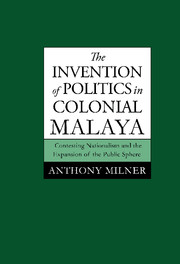 The Invention of Politics in Colonial Malaya
The Invention of Politics in Colonial Malaya Book contents
- Frontmatter
- Contents
- Preface
- Map of Malaya
- Introduction: Colonialism, Nationalism and Contest
- 1 The Ancien Régime: Described and Condemned
- 2 Establishing a Liberal Critique
- 3 A Description of the Real World: Expanding Vocabularies
- 4 Conceptualizing a Bangsa Community: A Newspaper of Moderate Opinions
- 5 Building a Bourgeois Public Sphere
- 6 Ideological Challenge on a Second Front: The Kerajaan in Contest with Islam
- 7 Answering Liberalism: Islamic First Moves
- 8 Kerajaan Self-reform: Chronicling a New Sultanate
- 9 Practising Politics in the Mid-Colonial Period
- 10 Surveying the Homeland: Sedar and Dialogic Processes
- Conclusion: The Malay Political Heritage
- Select Bibliography
- Index
1 - The Ancien Régime: Described and Condemned
Published online by Cambridge University Press: 18 December 2009
- Frontmatter
- Contents
- Preface
- Map of Malaya
- Introduction: Colonialism, Nationalism and Contest
- 1 The Ancien Régime: Described and Condemned
- 2 Establishing a Liberal Critique
- 3 A Description of the Real World: Expanding Vocabularies
- 4 Conceptualizing a Bangsa Community: A Newspaper of Moderate Opinions
- 5 Building a Bourgeois Public Sphere
- 6 Ideological Challenge on a Second Front: The Kerajaan in Contest with Islam
- 7 Answering Liberalism: Islamic First Moves
- 8 Kerajaan Self-reform: Chronicling a New Sultanate
- 9 Practising Politics in the Mid-Colonial Period
- 10 Surveying the Homeland: Sedar and Dialogic Processes
- Conclusion: The Malay Political Heritage
- Select Bibliography
- Index
Summary
The threat presented by any type of colonialism, of course, is in part ideological. The ancien régime of the Malay world had much to fear from the new doctrines of liberal Europe and the attack was not merely to be delivered by European writers. One Malay author in particular – Munshi Abdullah – was active in undermining the Malay monarchies, or kerajaan proposing certain new principles around which Malay society in the future might be articulated. Moreover Abdullah's critique is presented in such a form as to offer insights into the social system which he sought to replace.
When the British imperial presence commenced with the acquisition of Penang in 1786, the Malay Peninsula was divided among several sultanates, some of which also exercised authority in the surrounding islands. These Muslim polities possessed systems of government owing something to pre-Islamic models. The principles and assumptions upon which they were administered differed sharply from those operating in post-Enlightenment Europe.
Although the British advanced gradually into the peninsula, taking control of all the sultanates by 1914, the introduction of novel ideas and education began to promote new division in Malay society even in the early nineteenth century. (We shall see that the kerajaan had long been under ideological attack from certain Islamic quarters.) This chapter and the next examine the writings of one of the earliest liberal Malay critics of the sultanate system. We consider first the precise way in which this critic – Abdullah Abdul Kadir or Munshi Abdullah (1797–1854), a language teacher to Europeans in the Straits Settlements – perceived the ‘traditional’ Malay polity.
- Type
- Chapter
- Information
- The Invention of Politics in Colonial MalayaContesting Nationalism and the Expansion of the Public Sphere, pp. 10 - 30Publisher: Cambridge University PressPrint publication year: 1995


